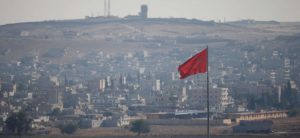Turkey’s President Tayyip Erdoğan asked NATO to exercise its mutual defence agreement stipulated by Article 5 of its charter when 33 Turkish troops were killed by Russian and Syrian forces in Idlib.
Turkey’s request is cynical and self-serving. Erdoğan betrayed the Alliance, siding with Russia in a war he helped foment.
After the 2011 popular uprising in Dara’a, which marked the beginning of Syria’s civil war, Erdoğan embraced the Muslim Brotherhood and supported Islamist rebels fighting the regime of Bashar Assad. Erdoğan envisioned himself the Caliph of Mesopotamia, leading a worldwide community of Sunni brothers.
Turkey was the major conduit for weapons and money, thinking the victory of jihadists was inevitable. However, Assad’s forces were tenacious.
Former U.S. President Barack Obama promised a regime change and drew a red line on the use of chemical weapons (CW). His warnings were hollow. More than 1,300 people, including hundreds of children, were killed in the Damascus suburbs of Ghouta, Muadhamiya, Ein Tarma, and Zamalka on 21 August 2013. Obama had no appetite for military intervention. He claimed the red line was a warning, rather an actual threat to intervene.
Erdoğan decided to expand support for the rebels and overthrow Assad he had, a year ago, hugged as ‘dear brother.’. Turkey’s National Intelligence Agency established the jihadi highway from Şanlıurfa in Turkey to Raqqa, the Islamic State (ISIS) capital in Syria. It assisted 40,000 foreign jihadists from more than 100 countries who transited through Turkey to the front lines in Syria.
The presence of Chechens and other Islamists from the Southern Caucasus was deeply unsettling to Russia. Their advances presented a risk to Russian bases in Latakia and Tartous, threatening Russia’s warm-water port on the Mediterranean. They also threatened Iran’s corridor through Iraq and Syria that was supplying Lebanon’s Hezbollah with sophisticated missiles to attack Israel.
General Qassem Soleimani, head of the Iranian Revolutionary Guard (IRGC) Quds Force, met Putin in Moscow. With Turkish-backed rebels advancing on Damascus, Soleimani unfurled a map of rebel positions. Despite the consternation of his Russian hosts, he assured them, “All is not lost.”
Russian and Iranian officials agreed on a plan to rescue Assad. The IRGC, Hezbollah, and other Shiite militias would engage Sunni rebels on the battlefield. Russia would provide air support.
Putin announced Russia’s military intervention at the U.N. General Assembly on September 28, 2015. Turkey and Russia were on opposite sides. Turkey supported regime change and gave weapons to the rebels, while Russia backed the regime.
Russian-Turkish relations collapsed when a Turkish F-16 shot down a Russian Sukhoi-24 along the Syrian border.
Turkey was also alienated from the United States. The United States and Turkey had a major falling out after Erdoğan alleged Washington’s complicity in the so-called coup of July 2015. Ever pragmatic, Erdoğan reached out to Putin and forged an alliance in Syria.
Turkey joined Russia in parallel diplomacy called the Astana process in January 2017. The Astana process marginalised the U.N. and excluded the United States.
Putin agreed to look the other way, while Turkish-backed jihadis and Turkish armed forces targeted the Syrian Kurds, who Erdoğan called the “real terrorists.”
Turkey invaded Afrin in January 2018. The offensive, cynically called “Operation Olive Branch”, killed hundreds of Kurds and displaced nearly a quarter million. Russia controlled the air space west of the Euphrates and was complicit.
Turkey invaded Kurdish lands east of the Euphrates in October 2019. Hundreds were killed and many displaced, including Kurds,
Armenians and Syriac Christians. Turkey’s jihadist proxies committed atrocities, mutilating the bodies of female fighters.
Erdoğan sought to dissuade Putin from attacking Idlib, the last rebel stronghold in Syria’s northwest. Despite Erdoğan’s appeal, Syrian ground forces backed by Russian air power intensified attacks, pushing 900,000 people from their homes. Turkey sealed its border leaving displaced Syrians with no place to go.
Turkey presents itself as the victim of actions by Russia and Syria. In fact, it is the aggressor.
The recent armed conflict between Turkey and Russia is a direct result of Erdoğan’s ill-conceived bravado. It was a strategic miscalculation to think that Russia and Syria would stand down in Idlib.
Now Erdoğan wants NATO involved. Article 5 of the North Atlantic Charter stipulates that an attack on one member of the Alliance is an attack on all members.
However, Erdoğan’s appeal has fallen on deaf ears. In addition to his duplicity, Erdoğan’s anti-American, anti-European and anti-NATO positions have deeply riled the West.
For sure, any loss of life is regrettable. It is, however, hard to side with the Turks when Erdoğan’s actions led to Turkey’s woes.
Turkey intensified the civil war by supplying jihadis. When the war persisted and millions of refugees went to Turkey, Erdoğan extorted money from the European Union to manage the refugee crisis, which he helped create. Turkey scorned the U.N., joining the Astana process, and it repudiated the U.S., spending $3 billion to buy Russian weapons.
The US assiduously avoided a military role in Syria. Years ago, it missed an opportunity to intervene when intervention could have saved Syria.
Despite the heart-wrenching suffering of people in Idlib, the Trump administration is unlikely to intervene militarily. Turkey will pay a steep price for Erdoğan’s hubris and bad judgment.
© Ahval English
The views expressed in this column are the author’s and do not necessarily reflect those of Ahval.





